Uncomfortable encounters: Fix+Foxy, the Danish company behind Dark Noon
On director Tue Biering and his formally adventurous approach to theatre.
Hello, and welcome to Café Europa, a weekly newsletter dedicated to European theatre. I’ve just returned from Slovenia where, as a member of the jury at the Maribor Theatre Festival, I watched 12 performances over eight days. We awarded our Grand Prize on Sunday to Nina Rajić Kranjac’s audacious and rain-defiant production of Angels in America. But this week’s newsletter is not about that. It’s about Tue Biering, a director with whose work I’ve long been fascinated, a relentless experimenter and co-creator of Dark Noon, which was one of the big success stories of last year’s Edinburgh Fringe and just opened in New York.
As ever, if you enjoy this newsletter, please share, subscribe or consider becoming a paid supporter. I love writing this, but it takes time. I also have a Ko-fi account, if you want to support my writing that way.
New York theatre-goers can currently see a performance about the American West made by a Danish theatre company with a cast of South African actors.
The show, Dark Noon, is the work of the innovative, experimental and adventurous Fix+Foxy. Co-directed by Fix+Foxy’s artistic director Tue Biering and Nhlanhla Mahlangu and performed by a company of actors in white-face make-up, it’s a story about the migrant experience - it was originally described as an “African western about European migration” - about the poor and hungry who set out to make a new life in the New World. It’s a story of the international cultural impact of the Hollywood western, about national self-mythology, about the history of America, from the arrival of the first settlers to the modern day. Over the course of the show, a small town is constructed on stage as, via a series of numbered scenes, we witness the dawn of industrialisation and capitalism, the building of the railroad, grinding poverty, widespread disease, and violence. So much violence. People are gunned down with regularity. Native Americans are placed behind metal fences. One scene pivots abruptly into a slave auction.
Since it premiered in 2019, Dark Noon has toured widely in Europe and it was one of the stand-out shows at last year’s Edinburgh fringe (I wrote about it in the very first edition of this newsletter). Before this year, however, Fix+Foxy had not performed it in the US. What was it like presenting this exploration of American mythology to American audiences?
Until relatively soon before the show opened, Biering says he had not considered how the show would land in America. “Suddenly it came to me that this is insane. Who am I to go and tell them about their story?”
When it was performed at Spoleto Festival in South Carolina ahead of the New York run, it was met with both ovations and walkouts, according to this insightful piece in the New York Times. “It’s about them, about their identity and their knowledge of their history. I think I was naive and probably stupid not to know that that might be a problem,” Biering says wryly.
Biering’s willingness and ability to interrogate his blind-spots is a key part of his work as a theatre maker. Fix+Foxy’s work frequently focuses on marginalised communities, the people to whom society often turns a blind eye: asylum seekers, welfare claimants, sex workers. Their most recent show The Berries of Wrath, which premiered at the Teater Republique in Copenhagen in May, is about the experience of strawberry pickers in Spain, the people who work in often exploitative conditions to ensure our supermarkets are full of fresh fruit.
The Berries of Wrath focuses on the experience of a group of Moroccan women working in Huelva. The set replicates the plastic-covered strawberry fields and cramped and overcrowded dormitories in which they live. The show is also heavily inspired, as the title implies, by John Steinbeck’s The Grapes of Wrath, his Pulitzer-winning depiction of the lives of migrant farmworkers during the Great Depression. The parallels, he says, are remarkable.
As in Dark Noon, Biering co-directs, this time with Spanish director Carlota Berzal. He found a Spanish fixer and conducted numerous interviews. He wanted to cast some of the workers in the show, so they would be able to tell their own stories on stage, but “Danish migration authorities are very strict.” They weren’t able to bring anyone with a Moroccan passport, he says, “which was most of the cast I wanted.” Only people with Spanish passports were permitted to come. “We hadconversations with a lot of lawyers,” he says.
He also wanted to cast Danish children as a way of making the power imbalance more vivid. not be the bearer pickers being very pickers, but they will be in power of the kids being the best directed. It was also partly because, Biering says, his kids are often the ones demanding strawberries, saying “Daddy, Daddy, can we please have strawberries out of season?”
The research process was eye-opening. There is, he says, an agreement between Spain and Morocco that is approved by EU that workers can come for three months to Spain to pick berries and then go back. These workers should be women. They should be young with children, and ideally, uneducated so they don't understand Spanish. This is part of the job specification, he says, “which is kind of incredible, but, of course, it makes total sense.” Spanish immigration law is such that if you work in the country for a certain amount of time you are entitled to a work permit This often encourages people to overstay their visas, which is actually to the benefit of the employers, the show suggests, because illegal migrants are even easier to exploit.
The Berries of Wrath sets out to show the situation in Morocco, the reasons why people travel to other countries to find work. “For a lot of people, the conditions are really terrible. If you have work, it's really low paid and doesn't take you anywhere.” You might be able to earn enough to stay alive, but it's not giving you any idea, like it can get better and then how to is the first three months but that’s about it. The show depicts what it’s like to come to country to work where you don't understand the language. “The Danish kids don't understand Arabic and Spanish, but they are spoken to in Spanish and Arabic all the time, so they don't know what's happening,” he explains. “They’re put in the same position as the Moroccan workers in Spain.”
The show also looks at the attempts to bring exploitative employers to justice. There have been trials against the employers, but “they have strategies, of course, on how to make the workers lose the cases.”
The four people featured in the show not only represent themselves, they represent their friends, relatives and the people they know. “They are the voice of a lot of people. So it's very it's very authentic, very much a documentary.”
“Theatre in an activist way”
When Biering was young, he wanted to be a writer but ended up in theatre, almost accidentally after attending an audition with a friend. He studied directing at the Danish National School of performing arts and was always interested in “pushing theatre technically in a way that wasn't seen before.” He ended up working at the National Theatre for three years, but after that he says, he “kind of lost faith in theatre and art. As he describes in his essay on the history of Fix+Foxy, Hostages of Me, he had grown fed up of making what he describes as “feel-good, no-harm theatre.” Theatre that didn’t change anything, that didn’t have any societal impact. For a time, he and a friend considered becoming activists. “We wanted to change the world by activism but very soon came to the conclusion we were not very good activists.”
“We didn't know anything about activism,” he said, so we thought maybe instead we should continue to do theatre, “but maybe we could do theatre in an activist way.” What this meant in practice was work that would plant ideas in people's minds. It was also important to invite real people on stage, instead of having them represented by actors. You can have a good text and be thorough in your research, but “there's still such a difference between that and having the real people standing stage.”
In 2008, Biering applied this principle to a show about sex work, about the power dynamics involved in purchasing another person’s sexual services. Prostitution is legal in Denmark but sex workers aren’t entitled to many benefits. If you want to address this topic, Biering says, buying another person is a much more efficient and powerful gesture, “putting the workers on stage and not just having a representation.”
Using the 1990 romcom Pretty Woman as a basis, each night they paid a sex worker to perform the role of Julia Roberts’ character, Vivian in the performance which took place in construction site containers in the red-light district of Copenhagen. Biering and co-director Jeppe Kristensen spoke to a lot of former and current sex workers while researching the show. The resulting show was called Pretty Woman Ltd. The sex worker was fed her lines via earpiece and a pane of glass separated the performers from the audience, who were informed that the money they had paid for their tickets went to cover the amount that the she would have earned if she had been working instead of performing that night. This fascinating, in-depth piece details the process behind the making of that show, the ethical considerations, critical reception and whether or not this was ‘reality theatre.’ (“I don’t do reality theatre – I do theatre,” said Biering).
Pretty Woman Ltd caused a media storm at the time, not just domestically but globally, with lots of hand-wringing about the fact that state funding had been spent on it. There were benefits to this, says Biering pragmatically. Even though the scale of the show meant only a relatively small audience ever saw it, its notoriety is such that many years afterwards he can “mention this production to anyone and they have heard about it.” It is a good example of creating a show that “would still exist in the minds of people, and even for those who haven't seen the production, it will still be something they had to reflect upon.”
This merging of reality and fiction is a recurring thread in their work, In 2010, Fix+Foxy reworked the monster-hit US sitcom Friends, casting asylum seekers from camps around Copenhagen as Monica, Chandler and co. They created a television studio and familiar sets from the sitcom and the live-in-front-a-studio-audience format. Friends is one those shows that is imbedded in the collective consciousness. We know the characters and their catchphrases intimately. Biering wanted to utilise that sense of cultural connection and to place asylum seekers in that setting (along with some famous Danish actors as guest stars). It was intended as a kind of antidote to the solemnity and concern that often surrounds work about asylum seekers and their stories.
“Creating things for the future”
In 2016, their production Welcome to Twin Peaks saw the local inhabitants of the island community of Odsherred driving audience members though the night to meet other locals and listen to their personal stories. Using David Lynch’s cult show as inspiration, it was a piece about rural communities and, once again, about people meeting people they may not ordinarily encounter. This was true too of Against All Odds, their 2019 show which used statistics to forecast the future of 22 children between 10-14 years-old. The children were also cast to statistically represent society. “That for me was a really great experience,” he says, because the children’s parents also ended up in the same room together, people who maybe “never thought they were going to exist in the same space at the same time.” The resulting conversations were very powerful. “I hope that with that kind of production we are really creating things for the future.”
The process of making work varies from show to show. What matters most is having a strong concept and a clear vision, he says, but still being willing to question yourself about how to attain it. With The Berries of Wrath, for example, he explains, even after he’d had the idea of using children in the production, a level of doubt remained. He held “many workshops with kids, with people shouting at them in Arabic to test the idea,” before he decided to stick with it as a concept.
With Dark Noon, on the other hand, the original idea had been to tell a story about Africa. “I wanted to do a production about my own idea of Africa, and not only my own, but the European gaze on Africa,” he explains, “which is very much aligned with the with the narrative of a western movie, where we are the frontier of civilization.”
However after spending time with the actors in Johannesburg, he started to question whether this was the correct approach. He asked the actors whether they would consider flipping the concept and shifting their focus onto America. They responded positively. “I think it artistically liberated us actually,” he says.
The last, and arguably strongest, moments of Dark Noon see the actors reflecting on the westerns they watched as children, the films full of gunplay and heroic white men in cowboy hats which shaped their idea of America, and the mythology they absorbed.
Biering also resists issuing specific casting profiles because they can be limiting. “Sometimes having a conversation with a person can open a door that I didn't even know existed.” Working with people from non-acting backgrounds, he says, “it's very important for me to create a space where people feel confident in sharing and contributing with their creativity.”
Pop culture is also, as you can probably tell, a key element of their work. With Pretty Woman Ltd, they had known they wanted to make a piece about sex work but didn’t know how to frame it. The minute someone suggested the movie, it felt like the obvious and only choice. “It’s one of those narratives all of us globally recognise,” he says. Similarly with Twin Peaks, even if people haven’t seen the show, they have some idea of it, the quotes, the memes, the vibe. “Everybody knows about it as a phenomenon,” he says. “And the gift of working with pop cultural phenomenon is that everybody has an idea about it, everybody feels familiar with it, and then we can kind of tweak it – we can make it meet the real people.”
In Rocky! The Return of the Loser, Biering used the plot of the 1976 Stallone film as the basis for a one-man show about underdogs and what happens if the beaten down and politically downtrodden rise up. What if the left is suddenly confronted with a movement who stand for and vote for things they don’t condone? It’s a piece that feels even more potent now in light of the results of the recent European elections. Oh, and it also features an actual pig carcass on stage (I regret not asking about the pig logistics), which the actor proceeds to batter with a baseball bat
In 2022, Fix+Foxy brought Rocky! to the Edinburgh Fringe. It was something of a learning curve. The Fringe was still feeling the after-effects of Covid, audience numbers were low, media coverage patchy, and the show, I think it’s fair to say, was not the easiest sell. The experience left him feeling that he never wanted to come back to the Fringe. However, the Pleasance, one of the Fringe’s biggest venues, were very keen to bring Dark Noon to Edinburgh. 100 minutes long and technically complex, it is not a typical fringe show, but they found a way to make it work – staging it at the EICC, one of the Fringe’s biggest performance spaces and putting some marketing oomph behind it.
Glowing reviews followed. The critical response in New York has also been largely positive. “Dark Noon is a frenetic, triumphant production that is both hugely entertaining and deeply thought-provoking for American audiences in particular,” writes New York Theatre Guide.
“I want to take dynamite and blow it up”
Given the political climate in Europe, the deepening inequality and polarisation, how does Biering feel about the future? How does he feel about the kind of theatre he is making, and that he hopes the make? “I think about this constantly,” he says. His response is two-pronged. On the one hand, he is constantly trying out new formats and challenging the idea of what theatre can be,” he says. “Theatre itself can be very conservative,” he says. It can also be very narrow in its definition of what counts as real theatre. “I'm very provoked by that,” he says. “I just want to take dynamite and blow it up. I’m very challenged by people who say: You cannot do that. That is not theatre.” It makes him want to prove them wrong.
He also feels theatre could do more digitally. That’s how he hopes to work, bringing people from all over the world on stage digitally. “I have to prove that the digital experience can be as intimate as having a person in the space with you.” (It sounds like 2025 production The Village will have a strong digital component).
Biering describes himself as an introvert and a private person. Making the kind of work he makes gives him permission to have conversations with the kind of people he would never otherwise have met, he says. He remains ever-vigilant of his own blind spots, mindful of the topics about which he doesn’t really know very much, though would like to know more. “I'm very much led by my own curiosity,” he says, “and my own questions.”
This week in European theatre
A round-up of festivals, premieres and other upcoming events over the next seven days.
Venice Theatre Biennale – The theatre strand of the Venice Biennale kicked off on the 15th with a Gob Squad double-bill and runs until 30th June. The programme includes work by Tim Crouch, Australia’s Back to Back Theatre, Miet Warlop with After All Springville and Milo Rau with Medea’s Children.
FITS/Sibiu International Theater Festival – The Romanian festival mixes theatre, music and dance from all over the world and programme highlights this year include work by Pippo Delbono, Łukasz Twarkowski, Timofey Kulyabin and Tim Robbins and the Actors’ Gang. It runs from 21st-30th June.
GREC Festival de Barcelona - The 48th edition of Barcelona’s summer arts festival takes place at 50 venues across the city, but centres on the Greek-style outdoor Theatre Grec. The 2024 programme includes Krzysztof Warlikowski’s Elizabeth Costello, a double bill from NeedCompany - Billy’s Violence and Billy’s Joy – and Lola Arias’ piece about cis and trans women in prison, Los Dias Afuera. The festival runs from 26th June – 4th August.
Thanks for reading! If you have any feedback, tips, thoughts or other comments you can reach me on natasha.tripney@gmail.com


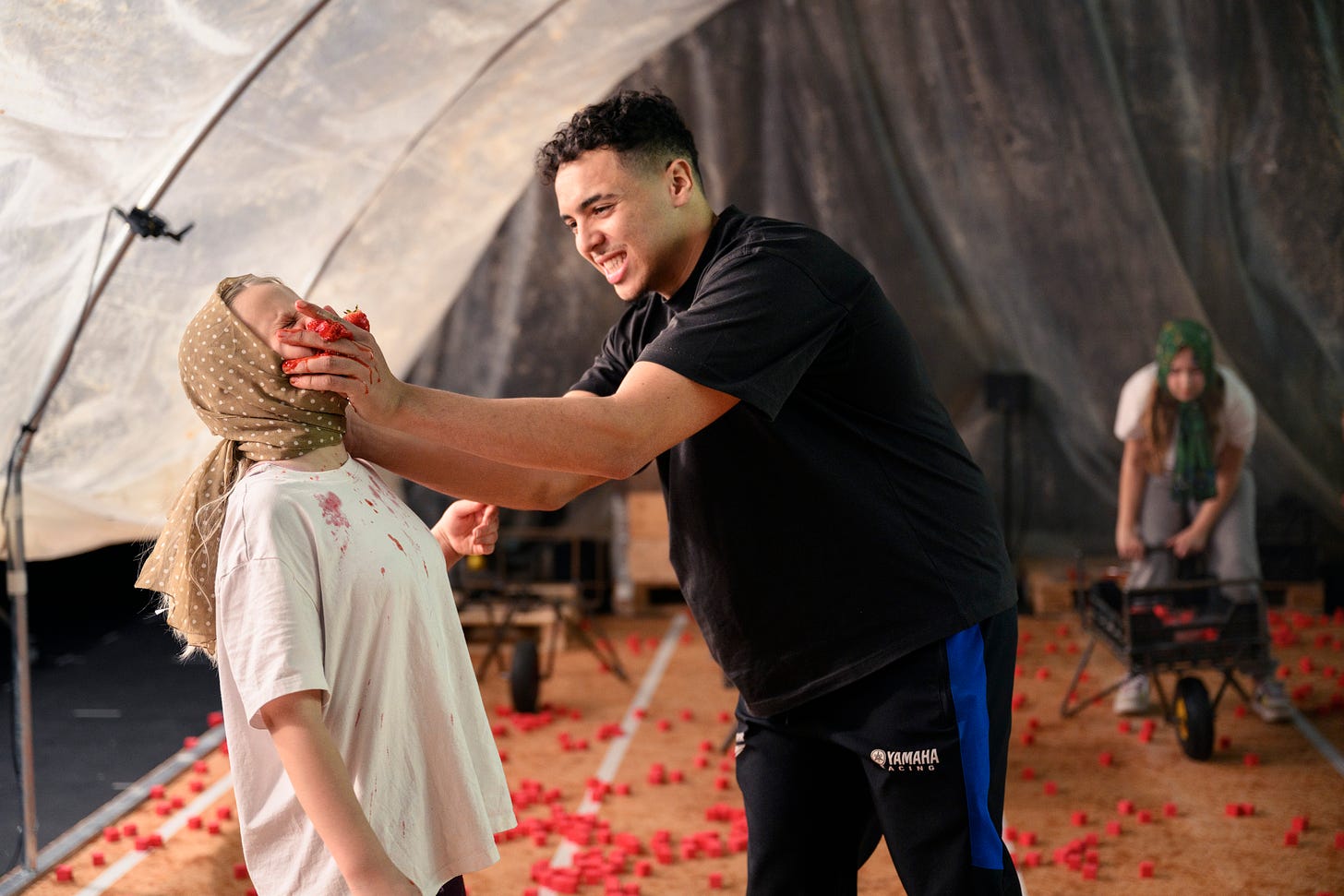
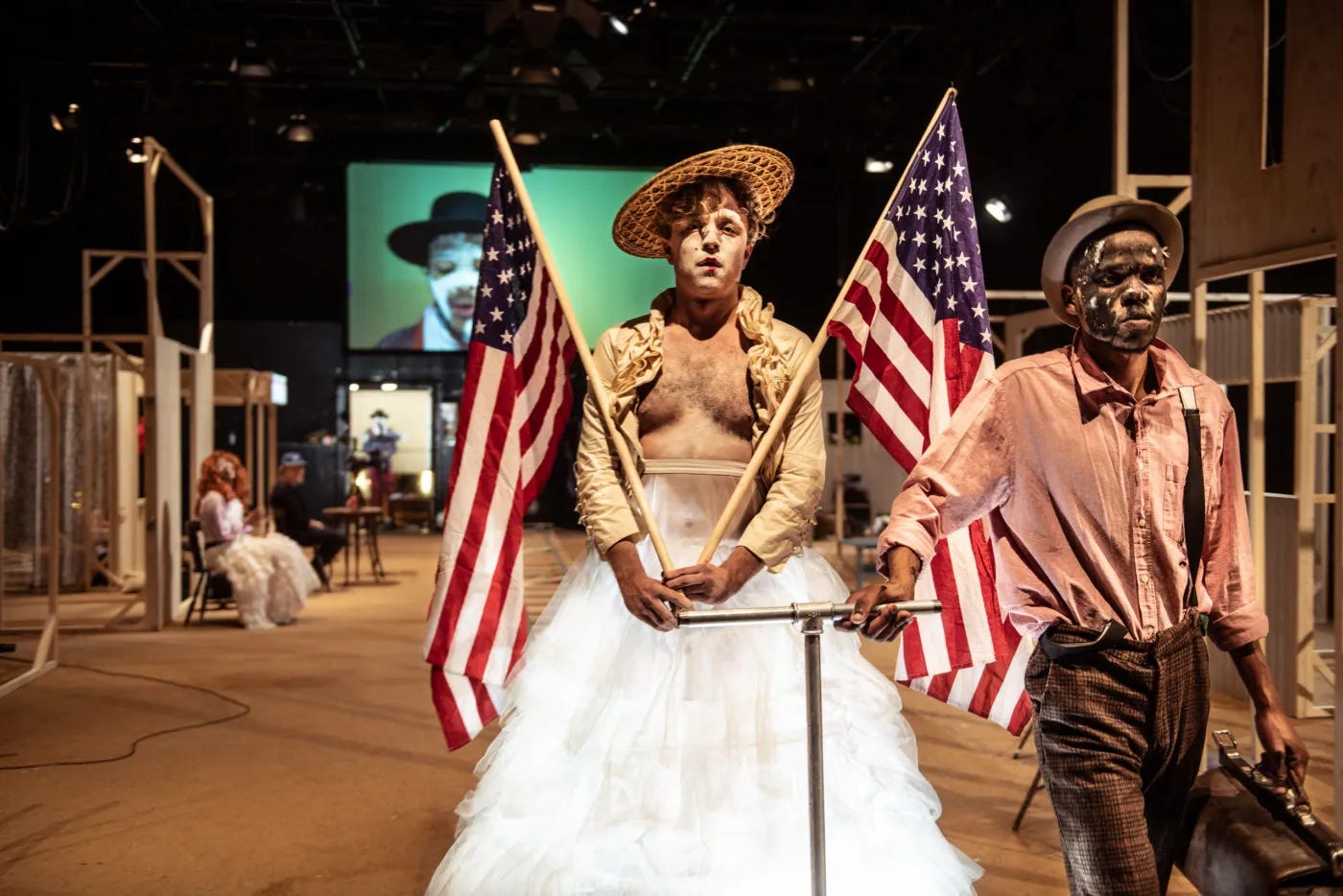
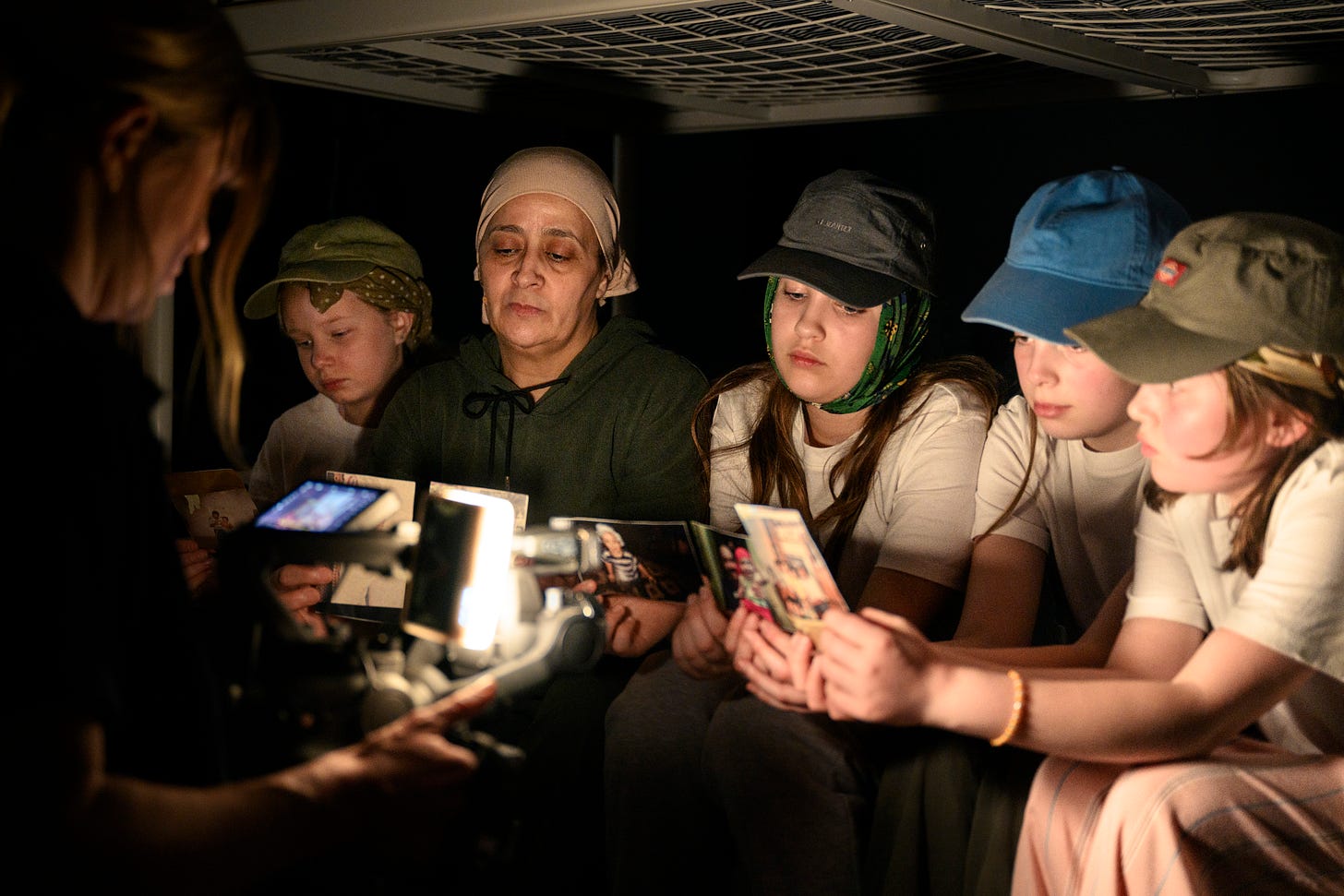
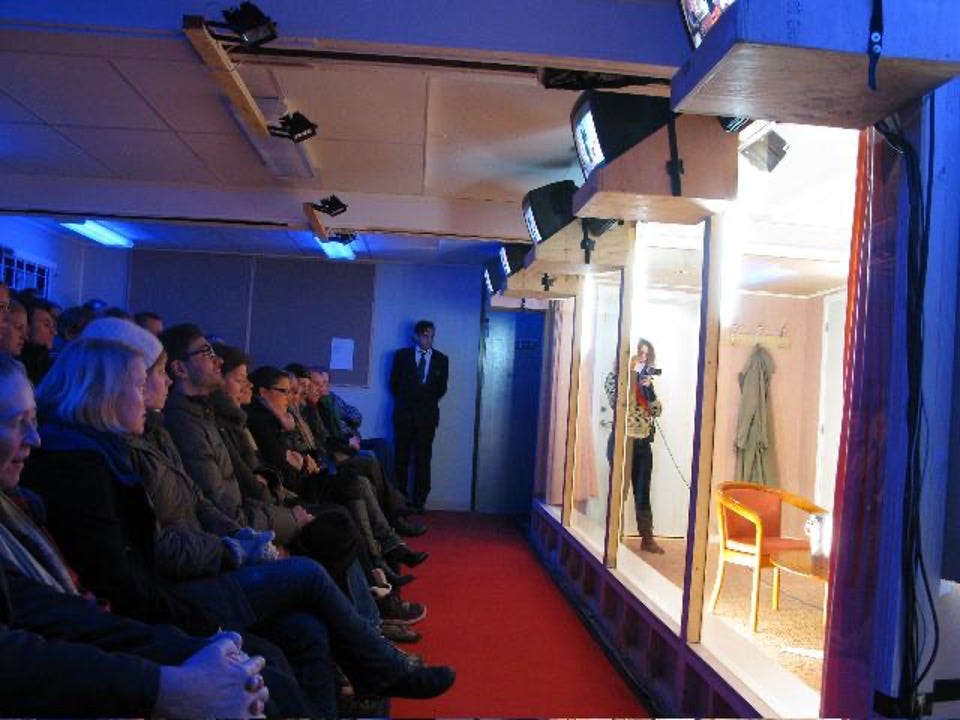
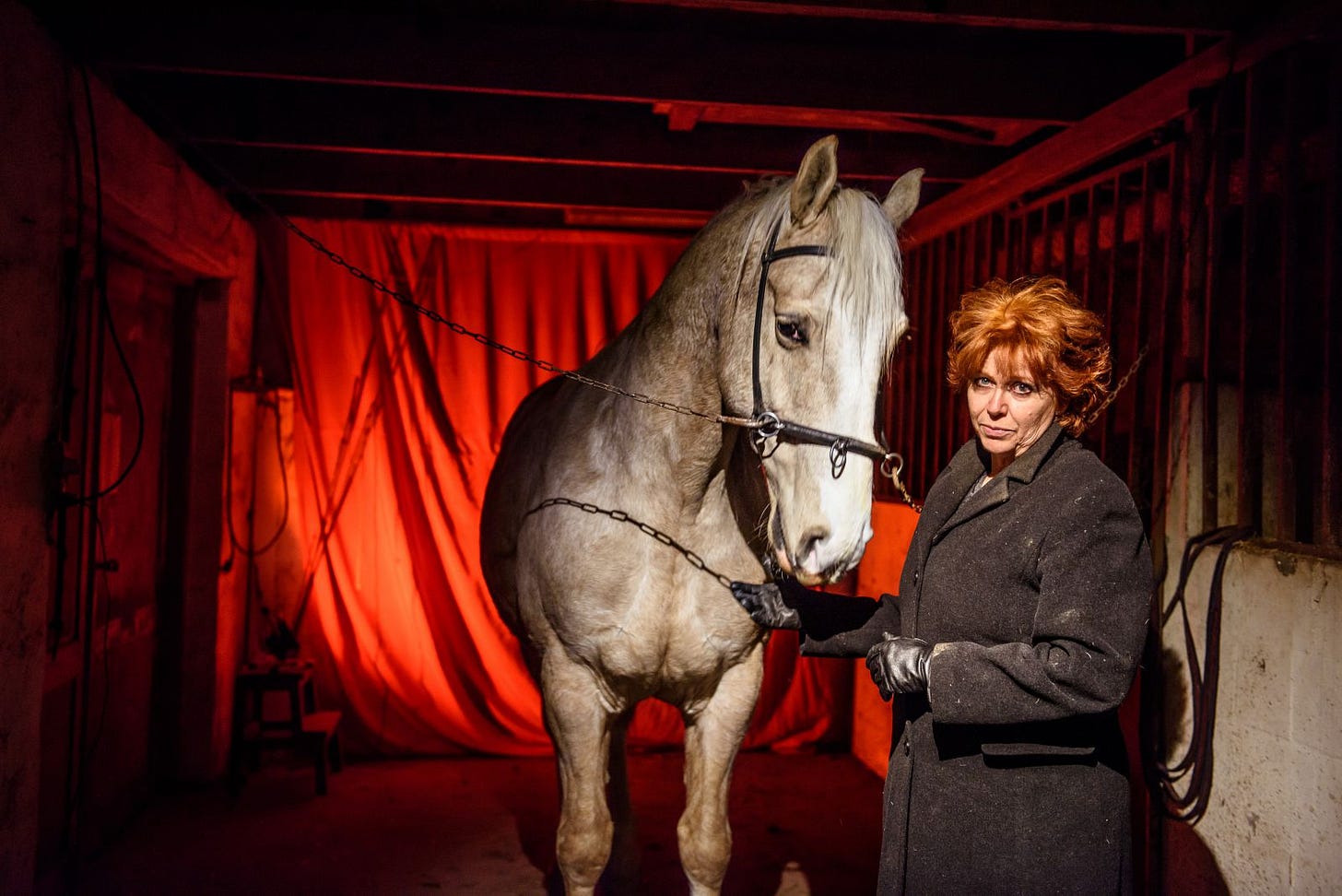
Would love to find out how Biering might adjust Dark Noon after encountering American audiences. Having gone to school in Germany, and worked in London, there is an anti-American superiority there that one confronts - often repeatedly. Not having seen the play or his work, I assume Dark Noon would arise from that need to placate European audiences, making them feel a bit less guilty for their own roles in colonization.
So now I do hope Dark Noon travels and is available to watch. Because I am curious….